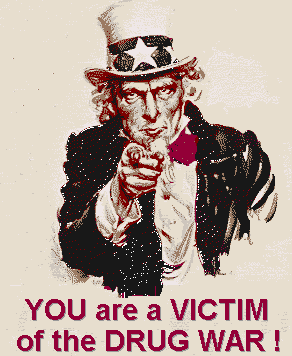A better mayor, on drug policy at least...
It's about time that we get over the stigma associated with many of the false assumptions that dominate this debate, and pragmatically move forward on eliminating pot prohibition. As someone who has both walked the streets as a member of the RCMP's drug squad and examined legislation for passage into law as a Senator, I have a sharp understanding of what constitutes a criminal. Those that use pot just don't fit the profile.Campbell's rational call for change stands in stark contrast to the strong anti-marijuana stance of another former mayor, New York City's Rudy Giuliani, who radically increased marijuana arrests and even opposes medical marijuana use. Campbell's actually for legalization across the board -- according to our 2003 interview with him, though not optimistic of it. Keep up with Canada drug policy news through our topics page here (or the RSS feed for it here). Or just read our newsletter...
Drug War Chronicle Book Review: "High Society: How Substance Abuse Ravages America and What to Do About It," by Joseph Califano (2007, Public Affairs Press, 270 pp., $26.95 HB)
Ann Althouse Insults Medical Marijuana
Popular law blogger Ann Althouse concurs with Rudy Giuliani's ignorant remarks about medical marijuana:
I appreciate that Althouse is open to legalization, but her casual and unsupported affirmation of Giuliani's remarks is uncalled for."You can accomplish everything you want to accomplish with things other than marijuana, probably better. There are pain medications much superior to marijuana," he said."We'd be much better off telling people the truth. Marijuana adds nothing to the array of legal medications and prescription medications that are available for pain relief."I think he's right. But perhaps marijuana should be legalized, not just for people who can portray themselves as sick enough, but for any adult.
The fact that medical marijuana advances the interests of the legalization crowd doesn't mean it's a trick. Legalizers were simply among the first people to speak up about the treatment of patients. That's changing rapidly now. Do these groups sound like key players in a marijuana legalization conspiracy, Ann?
* The American Academy of HIV Medicine (AAHIVM)
* The American Nurses Association (ANA)
* The American Public Health Association (APHA)
* The American Society of Addiction Medicine
* British Medical Association
* The National Association for Public Health Policy
* The National Nurses Society on Addictions
* The Episcopal Church
* The Presbyterian Church USA
* The United Church of Christ
* The United Methodist Church's Board of Church and Society
* The Union of Reform Judiasm
* The Unitarian Universalist Association
All of these organizations (and many more) have endorsed medical marijuana, and they're probably a bit more credible than OxyContin representative Rudy Giuliani.
Politics aside, why is it so hard to agree that people who donât feel good should be allowed to feel better by using marijuana? Regardless of what anyone says, marijuana becomes a medicine when sick people successfully use it to treat their symptoms. That's what medicine is, by definition.
The "other options" argument is ludicrous because it is vital that sick people be given as many options as possible. Medical marijuana patients include people who are allergic to other medicines. Many patients use other medications as well, but find that marijuana settles their stomach after eating a dozen pills. For some, marijuana relaxes the muscles and/or the mood in ways that other medicines do not. Many of these "other options" are more toxic and more addictive than marijuana, and that is just a fact.
Patients and their doctors are the first people one should consult for information on the efficacy of medical marijuana, and their experiences should always matter more than the politicized fulminations of an authoritarian former prosecutor on the campaign trail.

